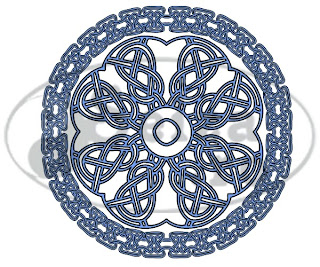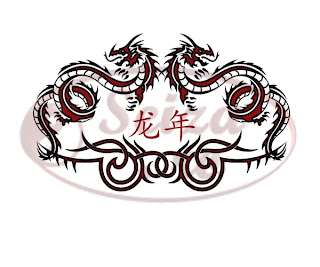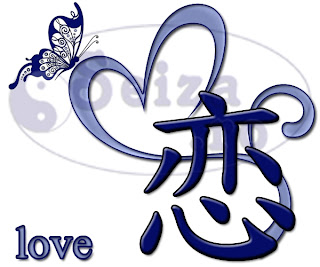Tuesday, February 22, 2011
Tuesday, February 15, 2011
Celtic tattoos
Celts once covered a large area of Europe and had their own languages and culture, not to mention religion. The symbols they used in those days are incorporated into the highly popular Celtic tattoos used today.
The Celts worshipped gods and goddesses, animals and the land, and as they were exposed more and more to Christianity, their symbols and shapes started to change into crosses and stars. One of the reasons for this adaptation was to avoid conflict with Christian beliefs. But, these adapted elements are what remains and what is most seen in traditional tattoos.
Celtic Knot Patterns
Although many traditional Celtic designs are copied in tattoos, perhaps one of the most recognizable and coveted tattoo is the knot. Knots resemble interwoven vines and are arranged to form a particular shape, for example a heart, but their shape can be almost anything a person can think of, from circles to the more complex star shape.
A Celtic knot also carries with it the symbolism recognizable by anyone who has even a slight knowledge of Celtic art which is that it represents continuous life as well as the season's cycles and the complexity of nature.
Animals were very important to the Celts, animals such as butterflies, dogs and geese. Butterflies were especially held in very high esteem by the Celts because of their beauty. Dogs symbolize loyalty and good luck while eagles are linked with death, so are ravens and other birds. Horses were sacred to the Celts and a tattoo depicting a horse is linked to mystery and magic. Power can be symbolized by a Celtic art tattoo of a bear while the dragon is associated with both power and magic. Sometimes an animal will be the main focus in a tattoo while others may form on a part of the background.
The number three, 3, has always featured highly in Celtic designs and is typically found somewhere in the design, at times even hidden deeply within it. It can be small or large.
Cross
The Celtic cross is without doubt perhaps the most recognisable of all Celtic designs and is a very popular tattoo subject. They are highly religious in their nature and quite often Celts will wear the design as a proclamation of their ethnic roots.
The Celtic tree of life is quite self-explanatory, it follows the same style as the knot and the cross but it is composed of interweaving lines which form branches around a tree trunk. It represents the beginning and end of life and also the eternal nature of the world we live in.
Claddagh
A Claddagh, though maybe not as well known is popular and is perhaps more recognizable to those of Celtic and Irish heritage. Consisting of two hands clasping a heart covered by a crown. When represented graphically in the form of a tattoo, it stands for everlasting love and loyalty.
Author: Tim Lazaro
Source: ezinearticles.com
The Celts worshipped gods and goddesses, animals and the land, and as they were exposed more and more to Christianity, their symbols and shapes started to change into crosses and stars. One of the reasons for this adaptation was to avoid conflict with Christian beliefs. But, these adapted elements are what remains and what is most seen in traditional tattoos.
Celtic Knot Patterns
Although many traditional Celtic designs are copied in tattoos, perhaps one of the most recognizable and coveted tattoo is the knot. Knots resemble interwoven vines and are arranged to form a particular shape, for example a heart, but their shape can be almost anything a person can think of, from circles to the more complex star shape.
A Celtic knot also carries with it the symbolism recognizable by anyone who has even a slight knowledge of Celtic art which is that it represents continuous life as well as the season's cycles and the complexity of nature.
Animals were very important to the Celts, animals such as butterflies, dogs and geese. Butterflies were especially held in very high esteem by the Celts because of their beauty. Dogs symbolize loyalty and good luck while eagles are linked with death, so are ravens and other birds. Horses were sacred to the Celts and a tattoo depicting a horse is linked to mystery and magic. Power can be symbolized by a Celtic art tattoo of a bear while the dragon is associated with both power and magic. Sometimes an animal will be the main focus in a tattoo while others may form on a part of the background.
The number three, 3, has always featured highly in Celtic designs and is typically found somewhere in the design, at times even hidden deeply within it. It can be small or large.
Cross
The Celtic cross is without doubt perhaps the most recognisable of all Celtic designs and is a very popular tattoo subject. They are highly religious in their nature and quite often Celts will wear the design as a proclamation of their ethnic roots.
The Celtic tree of life is quite self-explanatory, it follows the same style as the knot and the cross but it is composed of interweaving lines which form branches around a tree trunk. It represents the beginning and end of life and also the eternal nature of the world we live in.
Claddagh
A Claddagh, though maybe not as well known is popular and is perhaps more recognizable to those of Celtic and Irish heritage. Consisting of two hands clasping a heart covered by a crown. When represented graphically in the form of a tattoo, it stands for everlasting love and loyalty.
Author: Tim Lazaro
Source: ezinearticles.com
celtic bracelet and pendant tattoo
celtic bracelet tattoo
celtic pendant tattoo
Monday, February 14, 2011
Free dragon tattoo designs (II)
Chinese symbol for the year of the dragon (Hànzì: 龙年; pinyin: lóngnián)
Japanese symbol: War (Kanji: 戦争; hiragana: せんそう; reading: sensoo)
Chinese (traditional chinese) / japanese ideogram: Dragon (Japanese: Kanji: 龍; hiragana: 1 たつ 2 りゅう 3 りょう; reading: 1 tatsu 2 ryuu 3 ryoo) (Chinese: Hànzì: 龍; pinyin: lóng)
Sunday, February 13, 2011
Chinese dragons tattoos:
- Tianlong (Chinese: 天龍; pinyin: tiānlóng; Wade–Giles: t'ien-lung; literally "heavenly dragon"), celestial dragon that guards heavenly palaces and pulls divine chariots; also a name for Draco (constellation)
- Hong (Chinese: 虹; pinyin: hóng; Wade–Giles: hung; literally "rainbow"), a two-headed dragon or rainbow serpent
- Teng (Chinese: 螣; pinyin: téng; Wade–Giles: t'eng) or Tengshe (simplified Chinese: 腾蛇; traditional Chinese: 騰蛇; pinyin: téngshé; Wade–Giles: t'eng-she; lit. "soaring snake") is a flying dragon without legs
- Shenlong (Chinese: 神龍; pinyin: shénlóng; Wade–Giles: shen-lung; literally "god dragon"), thunder god that controls the weather, appearance of a human head, dragon's body, and drum-like stomach
- Longwang (Chinese: 龍王; pinyin: lóngwáng; Wade–Giles: lung-wang; literally "Dragon Kings") divine rulers of the Four Seas
- Fucanglong (Chinese: 伏藏龍; pinyin: fúcánglóng; Wade–Giles: fu-ts'ang-lung; literally "hidden treasure dragon"), underworld guardian of precious metals and jewels, associated with volcanoes
- Bashe (Chinese: 巴蛇; pinyin: bāshé; Wade–Giles: pa-she; literally "ba snake") was a giant python-like dragon that ate elephants
- Dilong (Chinese: 地龍; pinyin: dìlóng; Wade–Giles: ti-lung; literally "earth dragon"), controller of rivers and seas; also a name for earthworm
- Yinglong (Chinese: 應龍; pinyin: yìnglóng; Wade–Giles: ying-lung; literally "responding dragon"), winged dragon associated with rains and floods, used by Huangdi to kill Chi You
- Shen (Chinese: 蜃; pinyin: shèn; Wade–Giles: shen; literally "giant clam"), a shapeshifting dragon or sea monster believed to create mirages
- Jiaolong (Chinese: 蛟龍; pinyin: jiāolóng; Wade–Giles: chiao-lung; literally "crocodile dragon"), hornless or scaled dragon, leader of all aquatic animals
- Panlong (Chinese: 蟠龍; pinyin: pánlóng; Wade–Giles: p'an-lung; literally "coiled dragon"), lake dragon that has not ascended to heaven
- Huanglong (Chinese: 黃龍; pinyin: huánglóng; Wade–Giles: huang-lung; literally "yellow dragon"), hornless dragon symbolizing the emperor
- Feilong (Chinese: 飛龍; pinyin: fēilóng; Wade–Giles: fei-lung; literally "flying dragon"), winged dragon that rides on clouds and mist; also a name for pterosaur (compare Feilong kick and Fei Long character)
- Qinglong (Chinese: 青龍; pinyin: qīnglóng; Wade–Giles: ch'ing-lung; literally "Azure Dragon"), the animal associated with the East in the Chinese Four Symbols, mythological creatures in the Chinese constellations
- Longma (Chinese: 龍馬; pinyin: lóngmǎ; Wade–Giles: lung-ma; literally "dragon horse"), emerged from the Luo River and revealed Bagua (concept) to Fu Xi
Chilong (Chinese: 螭龍; pinyin: chīlóng; Wade–Giles: ch'ih-lung; literally "demon dragon"), a hornless dragon or mountain demon- Qiulong (Chinese: 虯龍; pinyin: qíulóng; Wade–Giles: ch'iu-lung; literally "curling dragon"), contradictorily defined as both "horned dragon" and "hornless dragon"
Source: wikipedia.org
Chinese symbol for the year of the dragon (Hànzì: 龙年; pinyin: lóngnián)
Chinese symbol for the year of the dragon (Hànzì: 龙年; pinyin: lóngnián)
Saturday, February 12, 2011
Scorpion tattoos
One of the most popular symbol for tattoos, used both for men's tattoos and women's tattoos, scorpion tattoos can be tattooed at any part of the body.
Depending on the design, a scorpion tattoo can be dark and forbidding, elegant and sophisticated or sexy and attractive.


Tribal scorpions are done in black and gray. This kind of tattoo looks pretty tough and is more suited for men.
Unisex design
Unisex tribal tattoo with scorpion
Sexy scorpion tattoo
On seiza.ro you can find this tribal tattoo with the kanji for the zodiacal sign of the Scorpion. Japanese language: Scorpio (zodiac sign) 蝎座 (Kanji: 蝎座; hiragana: さそりざ; reading: sasoriza)
Friday, February 11, 2011
Tattoo colors
Here are some of the things that you should know about tattoo colors:
Black:
The best thing about black is that it does not fade over time. This is the main reason that many people choose to get their tattoos done entirely in black. Your tattoo will always be easy to see when you get it done in black, even if it does begin to fade over time. Keep in mind that gray, which is similar to black, will also remain brilliant over time.
White
One of the biggest problems with white tattoos is that they fade very quickly. Due to the sun, white tattoos often turn light brown or yellow in color. Many people also find that in comparison to other tattoo colors, white tends to be a much more painful option. The reason is because the tattoo artist will need to penetrate somewhat further into the skin for the color to be visible.
Pink and Red
These two colors are known to fade much more gradually than other tattoo ink colors. Keep in mind that it is best to opt for a bright or dark pink if you want to keep the tattoo looking brilliant. It is important to make sure that you are not allergic to pink or red before getting your tattoo done, however. These are the two most common tattoo ink colors for people to be allergic to.
Blue and Purple
In comparison to many other tattoo ink colors, blue and purple are not known to fade too quickly. To ensure that your tattoo will keep its lustrous color for years to come, it is a good idea to opt for dark or bold, bright shades of these colors. Violet and turquoise are two tattoo ink colors which can remain beautiful over time in your desgn. Light purples and blues will fade much quicker.
Yellow and Green
To avoid significant fading, it is a good idea to stay away from yellow and green tattoo ink. Not only do they fade the most significantly, but they also fade over the quickest amount of time. Although these colors can be great for accents, it is best to avoid having the entire tattoo done in yellow or green.
Snake tattoo, available on seiza.ro
Labels:
coloured tattoo,
kanji tattoos,
snake tattoo,
tattoos for men
Love in japanese
One of the most popular phrases in any language is probably “I love you.” In Japanese, “love” is “ai (愛),” and the verb form “to love” is “aisuru (愛する).” “I love you” can be literally translated as “aishite imasu (愛しています)”. “Aishiteru (愛してる),” “aishiteru yo (愛してるよ)” or “aishiteru wa (愛してるわ, female speech)” is normally used in conversation. However, the Japanese don’t say “I love you” as often as Western people do, because of cultural differences.
Ai tattoo
There is another word to describe “love” which is “koi(恋).” The kanji character for “kokoro (心, heart)” is included as part of both kanji characters.
Koi tattoo
Both “ai (愛)” and “koi(恋)” can roughly be translated as “love” in English. However, they have a slightly different nuance. “Koi” is a love for the opposite sex, or a longing feeling for a specific person. It can be described as “romantic love” or “passionate love.” While “ai” has the same meaning as “koi,” it also has a definition of a general feeling of love. “Koi” can be selfish, but “ai” is a real love. Here are some lines that explain them well:
“Koi is always wanting. Ai is always giving.”
Thursday, February 10, 2011
Subscribe to:
Posts (Atom)






















